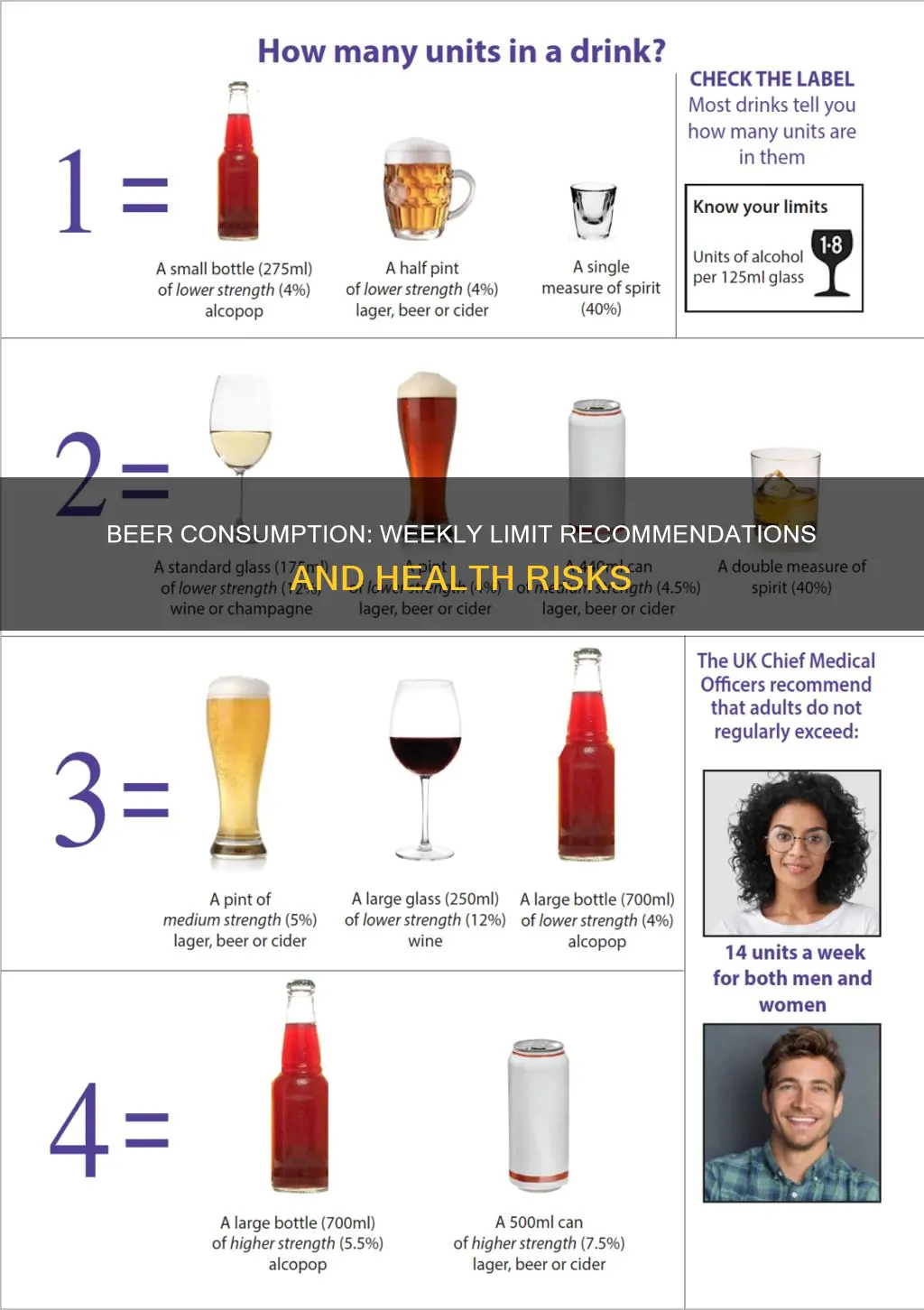
Drinking alcohol is a common way to celebrate, socialise or relax. However, it is important to remember that alcohol is a drug and that drinking too much can have serious health consequences. So, how much beer is okay to drink per week?
According to guidelines, moderate drinking is defined as up to one drink per day for women and up to two drinks per day for men. This equates to approximately seven drinks per week for women and 14 drinks per week for men. Exceeding these amounts is considered heavy or at-risk drinking and can lead to a higher risk of developing health problems, including liver disease, heart disease, stroke, cancer and dementia.
It is also important to note that any amount of alcohol consumed by pregnant women is considered excessive use and can lead to miscarriage, stillbirth or fetal alcohol syndrome. Additionally, alcohol should be avoided completely if you are planning to drive, operating machinery, taking certain medications, or have a medical condition that could be worsened by alcohol.
While moderate drinking may offer some health benefits, such as a reduced risk of diabetes, heart disease and dementia, excessive drinking can have severe negative consequences. Therefore, it is crucial to monitor your alcohol intake and stay within the recommended guidelines to maintain good health.
| Characteristics | Values |
|---|---|
| Upper limit for men per week | 14 |
| Upper limit for men per day | 4 |
| Upper limit for women per week | 7 |
| Upper limit for women per day | 3 |
| Amount considered "heavy" or "at-risk" drinking for men | More than 14 per week |
| Amount considered "heavy" or "at-risk" drinking for women | More than 7 per week |
| Amount that is considered binge drinking for men | 5 or more "standard" drinks in 2 hours |
| Amount that is considered binge drinking for women | 4 or more "standard" drinks in 2 hours |
| Amount that is considered "risky" drinking for men | More than 4 drinks in a day |
| Amount that is considered "risky" drinking for women | More than 3 drinks in a day |
What You'll Learn

Beer and health risks
Beer is the most widely consumed alcoholic beverage in the world. While drinking beer in moderation can have some health benefits, excessive consumption can lead to adverse health effects. Here are some health risks associated with drinking too much beer:
Weight Gain and Beer Belly:
Beer is associated with weight gain, which can be attributed to its relatively high calorie content, ranging from 120 to 150 calories per bottle. Beer also stimulates appetite, leading to increased food consumption. Additionally, alcohol breakdown takes priority over fat burning, resulting in unmetabolized fat being stored in the body.
Liver Diseases:
Beer consumption can lead to various liver diseases such as alcoholic hepatitis, inflammation, and cirrhosis or scarring of the liver tissues. Alcohol intake is the most significant contributing factor to liver diseases in the United States. Beer contains ethanol, which, when metabolized by the liver, produces acetaldehyde, a known carcinogen linked to oral, gastric, and breast cancer.
Cardiovascular Issues:
While limited consumption of beer may have some benefits for the heart, excessive drinking can lead to long-term increases in heart rate and negatively impact cardiovascular health. Studies have shown that beer drinkers have higher total cholesterol levels than non-drinkers, regardless of whether they consume alcohol-free beer.
High Blood Pressure:
Consuming several glasses of beer per day can lead to high blood pressure. Sticking to one or two mugs of beer is recommended to keep blood pressure levels under control.
Heartburn:
Beer contains stimulants that interact with gastric acid and can trigger gastro-oesophageal reflux, resulting in heartburn.
Intoxication and Hangover:
Excessive beer consumption affects the nerves and motor skills, leading to reduced inhibitions, impaired judgment, and reduced coordination. It can also cause a bad hangover, memory loss, and slurred speech.
Drug Interactions:
Beer interacts with certain medications, including sedatives and antibiotics. For example, it can interact with Erythromycin and lead to side effects like headaches and vomiting.
Gluten Insensitivity:
Most beer variants contain malted barley, which contains gluten. For individuals sensitive to gluten, opting for gluten-free beer options is advisable to avoid stomach discomfort.
Malnutrition:
Excessive beer consumption can lead to malnutrition as it provides minimal nutritional value and displaces essential nutrients from the diet. Chronic alcohol use may interfere with the absorption and utilization of vital vitamins and minerals, leading to malnutrition-related issues such as anemia, weakness, and a weakened immune system.
Accidental Injuries:
Alcohol consumption, including beer intake, has been associated with accidental injuries. It can also attract mosquitoes, increasing the risk of mosquito-borne illnesses like encephalitis, malaria, and dengue fever.
Sleep Disturbances:
Alcoholic beer consumption can cause an insulin spike, leading to sleep disturbances and a bad hangover.
Mosquito Attraction:
Alcohol ingestion has been found to attract mosquitoes, increasing the risk of mosquito-borne illnesses.
Diabetes:
Beer drinking can interfere with blood sugar levels as alcohol disrupts the liver's process of converting stored glucose into energy. This can be particularly concerning for individuals with diabetes.
Can You Lose Your Beer Belly? Stop Drinking to Find Out!
You may want to see also

Defining excessive drinking
Heavy drinking is defined as consuming four or more drinks on any day or eight or more drinks per week for women, and for men, it is defined as consuming five or more drinks on any day or 15 or more drinks per week. Heavy drinking markedly increases the likelihood of alcohol use disorder (AUD) and other alcohol-related harms.
The U.S. Dietary Guidelines recommend that for healthy adults who choose to drink, alcohol-related risks may be minimised by limiting intake to one drink or less in a day for women and two drinks or less in a day for men. These amounts are not intended as an average but rather as a daily limit. Drinking less is better for health than drinking more.
It is important to note that any drinking by people who are pregnant or under the age of 21 is also considered excessive drinking. Additionally, those with certain medical conditions or who are taking medications that interact with alcohol should avoid drinking altogether.
Beer Overload: Defining Heavy Drinking
You may want to see also

Recommended drinking limits
Recommendations for drinking limits vary depending on gender and health status. According to the U.S. Dietary Guidelines, healthy women should limit their alcohol intake to up to one drink per day, while healthy men should limit their intake to up to two drinks per day. These amounts are not averages but rather daily limits, with a weekly limit of seven and 14 drinks for women and men, respectively.
These guidelines are not without exceptions, as certain individuals should refrain from drinking alcohol altogether. This includes people who are:
- Under the age of 21
- Pregnant or planning to become pregnant
- Managing health conditions that can be worsened by alcohol
- Taking medications that interact with alcohol
It is also advised to avoid alcohol if you plan to drive a vehicle or operate machinery.
Exceeding these recommended limits is considered "heavy" or "at-risk" drinking, which increases the likelihood of developing health problems. Binge drinking, a pattern of drinking that raises blood alcohol concentration to 0.08% or higher, is also associated with various health risks. For men, this typically occurs after five or more drinks within two hours, while for women, it is four or more drinks.
While moderate drinking may offer certain health benefits, excessive drinking can lead to numerous health issues, including liver disease, heart disease, stroke, cancer, and an increased risk of injuries and violence. It is important to note that the negative consequences of excessive drinking can extend beyond health problems, impacting one's personal and professional life as well.
Exploring the European Preference for Warm Beer
You may want to see also

Alcohol and pregnancy
There is no known safe amount of alcohol use during pregnancy. All types of alcohol can be harmful to the baby, and drinking during pregnancy is associated with an increased risk of miscarriage, preterm birth, stillbirth, and sudden infant death syndrome (SIDS). Alcohol use during pregnancy can also cause a range of lifelong behavioural, intellectual, and physical disabilities known as fetal alcohol spectrum disorders (FASDs).
During pregnancy, alcohol passes from the mother to the fetus through the placenta and can seriously affect its development. The baby's liver is not fully developed and cannot process alcohol. Growth and central nervous system problems can occur from alcohol use at any time during pregnancy, and the baby's brain is developing throughout the entire pregnancy, so it can be affected by exposure to alcohol at any time.
Even if a woman only drinks occasionally or moderately during pregnancy, there is still a risk of the baby being born with FAS. However, the risk is greater for women who drink heavily or binge drink during pregnancy. Binge drinking is defined as consuming four or more drinks in about two hours for women and five or more drinks for men.
If a woman is pregnant or trying to become pregnant, she should not drink alcohol. This will keep any risk to the baby to a minimum. It is never too late to stop drinking during pregnancy, as stopping will improve the baby's health and well-being.
Is Root Beer Safe for Dogs to Drink?
You may want to see also

Alcohol and medication
While drinking alcohol in moderation can have some health benefits, it is important to remember that alcohol can have harmful interactions with certain medications. Mixing alcohol with medications can cause a range of side effects, from nausea and vomiting to more serious issues such as internal bleeding, heart problems, and breathing difficulties. Alcohol can also reduce the effectiveness of medications or make them harmful to the body.
It is important to note that even small amounts of alcohol can have these harmful interactions, and certain groups of people, such as women, older adults, and those with liver problems, are more susceptible to alcohol-medication interactions. Therefore, it is always advisable to check with a doctor or pharmacist about potential interactions before consuming alcohol while taking any medication.
- Antipsychotic medications, cold and flu medicines, and some antibiotics (such as metronidazole, azithromycin, and nitrofurantoin) can cause drowsiness, sleepiness, dizziness, fainting, changes in blood pressure, uncharacteristic behavior, and poor coordination when mixed with alcohol.
- Sleeping tablets, some anti-anxiety medications, and antidepressants can have additive sedative effects when combined with alcohol, increasing the risk of weakened breathing, heavy sedation, coma, and even death.
- Pain relief medications, such as aspirin, ibuprofen, and naproxen, can react with alcohol and increase the risk of stomach bleeding and ulcers.
- Herbal remedies, such as St. John's Wort, Kava Kava, and chamomile, can also have harmful interactions with alcohol, leading to abnormally low blood sugar levels, increased depression or hopelessness, and liver damage.
It is important to remember that this list is not exhaustive, and there may be other medications that can interact harmfully with alcohol. Therefore, it is always best to consult a healthcare professional or read the medication label and consumer medicine information before consuming alcohol while taking any medication.
Giving Up Beer: Strategies for a Healthier You
You may want to see also
Frequently asked questions
According to the Dietary Guidelines for Americans, moderate alcohol consumption is defined as one drink per day for women and two drinks per day for men. This amounts to a maximum of seven drinks per week for women and 14 drinks per week for men.
Excessive drinking is divided into two categories: binge drinking and heavy drinking. Binge drinking is defined as consuming enough alcohol to raise your blood alcohol concentration (BAC) to 0.08% or higher. This typically means having four or more drinks for women and five or more drinks for men within a two-hour period. Heavy drinking is defined as drinking eight or more drinks per week for women and 15 or more drinks per week for men.
Excessive alcohol consumption, including binge and heavy drinking, can lead to various health problems, such as unintentional injuries, violence, risky sexual behaviors, memory and learning problems, early dementia, tissue and organ damage, chronic diseases (liver disease, heart disease, stroke, cancer), gastrointestinal issues, weakened immune system, higher risk of obesity, depression, and anxiety. Additionally, excessive drinking can affect one's personal and professional life, leading to decreased productivity, job loss, financial issues, and relationship problems.







